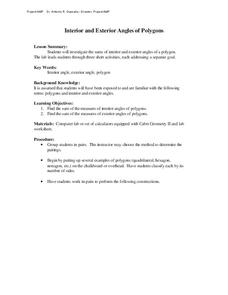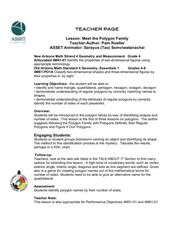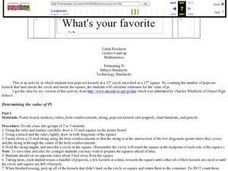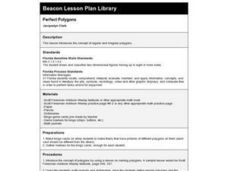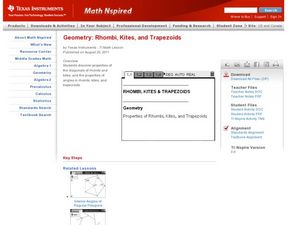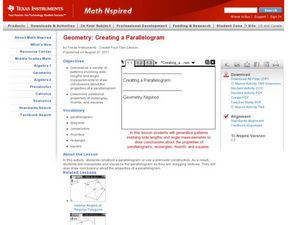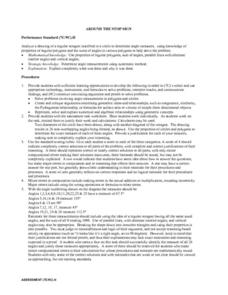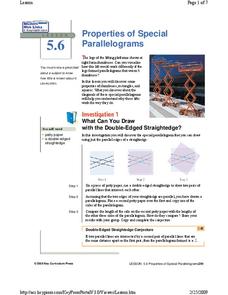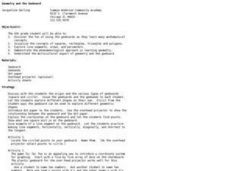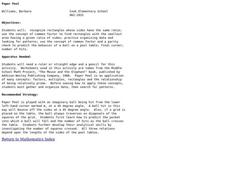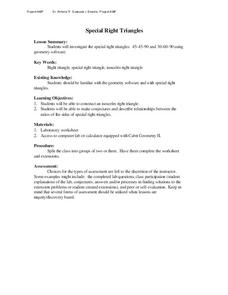Curated OER
Diagonals of Quadrilaterals
Teach your mathematicians how to identify different polygons based on their diagonals. Relating quadrilaterals to the different number of diagonals formed, students use the TI to create a visual of their shape.
Curated OER
Going out of Business: Pythagorean Theorem
Students find the length of diagonals. In this Pythagorean theorem lesson, students use the Pythagorean theorem to determine the length of diagonals.
Houghton Mifflin Harcourt
Unit 6 Math Vocabulary Cards (Grade 5)
Acute angles, nets, and vertices are only a few terms that a set of flash cards includes. Among the 108 cards, two types are available; word cards printed in bold-faced lettering, and corresponding definition cards equipped with an...
Houghton Mifflin Harcourt
Unit 5 Math Vocabulary Cards (Grade 6)
Acute angle, line of symmetry, and vertex are a few terms you'll find in a set of 90 flashcards designed to reinforce math vocabulary. Included in the set are two types of cards; a word card printed in bold font, and a...
Centre for Innovation in Mamatics Teaching
Area, Perimeter and Volume
Develop young mathematicians' knowledge of two- and three-dimensional shapes with this geometry workbook. From learning about the classifications of different shapes and figures to calculating their area, perimeter, and volume, this...
Curated OER
Diagonals to Quadrilaterals II
Learners identify the properties of different polygons. In this geometry lesson plan, students find the slope of a line and calculate the distance between two lines. They differentiate between similar and congruent polygons.
Curated OER
Interior and Exterior Angles of Polygons
Students identify interior and exterior angles of polygons. In this geometry instructional activity, students add interior and exterior angles of polygons. They use angle theorems to solve the problems.
Curated OER
Meet the Polygon Family
Fourth graders investigate regular polygons. In this regular polygon lesson, 4th graders explore the attributes of different polygons. Students work in groups to complete a KWL chart regarding polygons.
Houghton Mifflin Harcourt
Unit 6 Math Vocabulary Cards (Grade 3)
A set of 49 math vocabulary cards ranges from angle to irregular polygon to parallel lines. Each sheet contains two cards: one with the word printed in bold text and the other with the definition.
Curated OER
Polly and the Shapeshifter
Students analyze the patterns in polygons and relate it to the rate of change. In this algebra lesson, students discuss the relationship between the data and the graph of the data.
Curated OER
What's your favorite pi?
Sixth graders toss popcorn kernels at a 12? circle inscribed in a 12? square. By counting the number of popcorn kernels that land inside the circle and inside the square the students calculate estimates for the value of pi.
Beacon Learning Center
Perfect Polygons
Don't worry if you do not have the mentioned textbook; there is enough material here for you to carry out a pertinent polygon plan. After introducing your class to various polygons and the prefixes that help identify them, hand out...
Curated OER
Rhombi, Kites, and Trapezoids
Young scholars identify the number of diagonals for each polygon. In this geometry lesson plan, students identify the polygons based on their diagonals and the way it intersect. They create visuals using the navigator to see the changes...
Curated OER
Creating Parallelogram
Learning how to define vocabulary words related to solving parallelograms will assist your learners in identifying different parallelograms. They use the navigator to view different shapes created by moving the parallelogram around.
Curated OER
Square Graphs
Students identify the different properties of quadrilaterals. In this geometry-lesson plan, students define parallel sides and diagonals of polygons as they compare to a quadrilateral. They identify the methods to find the angles in a...
Curated OER
Principles of Square Roots Lesson Plan
Middle and high schoolers investigate all the different places in math that square root is present. In this geometry lesson plan, pupils discuss square roots as it relates to a right triangle and construction. They go over altitude,...
Curated OER
Platonic Solids
Students identify different types of polygons. In this geometry lesson, students differentiate between convex and regular shapes. they identify the names of two and three-dimensional objects.
Curated OER
Around The Stop Sign
Students analyze a drawing of a regular octagon inscribed in a circle to determine angle measures, using knowledge of properties of regular polygons and the sums of angles in various polygons to help solve the problem. They use...
Key Curriculum Press
Properties of Special Parallelograms
Rhombuses, rectangles and squares are have special properties. In this lesson, young geometers investigate and make conjectures about diagonals, angles, and parallel lines of parallelograms.
Curated OER
Geometry and Geoboard
Sixth graders use geoboards and dot paper to experiment with geometric concepts. In this geometry instructional activity, 6th graders complete four activities using geoboards or dot paper including naming points on a coordinate plan and...
Curated OER
Paper Pool
Students analyze the measurements of rectangles. In this analysis lesson plan, students will investigate patterns by looking at ratios. Students will also hypothesize the probability of a ball going into a certain pocket when playing...
Curated OER
Exploring Properties of Rectangular Prisms
Students explore the properties of rectangular prisms. In this geometry lesson, students identify properties of two and three dimensional shapes. They use Cabri technology to create polygons and solve problems.
Curated OER
Special Right Triangles
Learners identify different types of special right triangles. In this geometry lesson, students differentiate between right triangles and isosceles triangles. they construct the triangles using geometry software and make conjectures...
Curated OER
Finding the Area of a Parallelogram with Translations
Learners calculate the area of a parallelogram. In this geometry lesson, students perform translation using a coordinate plane and coordinate pairs. They perform translation on other polygons.








